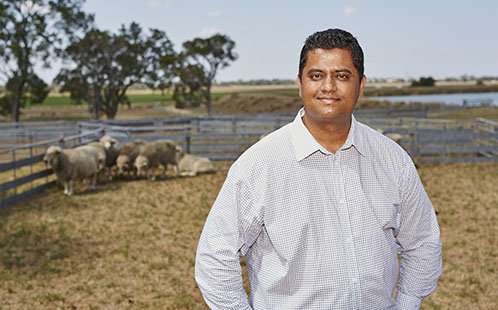Summer heat waves impede animal reproduction

As we swelter through the hot Australian summer, Western Sydney University researchers have provided an insight into the broad ranging physiological effects of summer heatwaves on animals.
Dr Edward Narayan from the School of Health and Science is the lead researcher and founder of the 'Stress Lab'. Based at the Hawkesbury campus, the facility uses non-invasive techniques to measure physiological stress in wildlife and livestock.
In a study published today in the prestigious PLOS ONE (opens in new window) journal, Dr Narayan and his team analysed the physiological stress of Australian merino sheep during an artificial insemination breeding program in Dubbo – and found that summer heat stress had a significant impact on reproductive success.
Faecal samples and body temperature measurements were collected from 15 superovulating donor merino ewes during the 2015/16 summer, when ambient temperatures reached up to 39.9 degrees Celsius.
"Sheep production systems in the arid landscapes of regional Australia are frequently exposed to high ambient temperature or 'heat waves' during the summer period," says Dr Narayan, who represents the University on the National Animal Welfare Steering Committee..
"Heat stress occurs when the environment acts to drive core body temperature above its normal range. This study sought to explain how key biological functions are affected by exposure to heat – and how heat stress may impact on reproductive function."
The study found body temperature of the ewes to be a statistically significant factor for reduced embryo survival.
"In our study, ewes that had higher recorded temperatures had a significantly lower percentage of transferable embryos," says Dr Narayan.
"It is assumed that elevated body temperature impedes certain reproductive processes that are crucial for embryo development. Heat stress is believed to reduce embryo production during the artificial insemination process, because the physiological and cellular aspects of reproductive function and early embryo development are disrupted."
Dr Narayan says these results suggest a plausible link between heat stress, physiological stress and reduced fertility in merino ewes.
"Given that the Australian merino sheep industry is heavily reliant on the breeding efficacy of its ewes in order to maintain a profitable business – further research is required to determine the full extent that hot Australian climates could be impacting reproductive output."
As part of his work in the Western Sydney University Stress Lab, Dr Narayan also investigates the key environmental stresses that are impacting on the mortality rate of Australia's native fauna – in particular koalas.
"Our non-invasive stress physiology technology provides a robust way to monitor the stress status of animals and so has immense value for animal breeding programs to bolster animal welfare."
"Like the merino ewe – koalas also experience chronic stress as a result of extreme heat, and research indicates that it may also be affecting their ability to breed," says Dr Narayan.
"In dry or high temperature environments, koalas must relocate to habitats that contain free standing water and eucalypts with high levels of leaf moisture, otherwise they will suffer from dehydration.
"Once a koala climbs or falls down and is on the vegetation floor, it is vulnerable to more stressors – like dog attack or vehicle collision. Also, for an animal that usually spends 19-20 hours a day resting or sleeping, this activity also incurs a cost on the koala's energy levels."
When koalas are stressed they release the stress hormone cortisol. Dr Narayan says high cortisol levels in koalas have been associated with diminished reproduction.
"Like the merino ewe, the breeding capacity of koalas is also impacted when we experience prolonged periods of higher than average temperatures," he says.
"When it comes to koala reproduction, extreme heat might not mean that Australia experiences the same losses in its agricultural sector – but it might experience an even greater loss, of one of its national treasures."
More information: Edward Narayan et al. Faecal glucocorticoid metabolites and body temperature in Australian merino ewes (Ovis aries) during summer artificial insemination (AI) program, PLOS ONE (2018). DOI: 10.1371/journal.pone.0191961
Journal information: PLoS ONE
Provided by University of Western Sydney




















